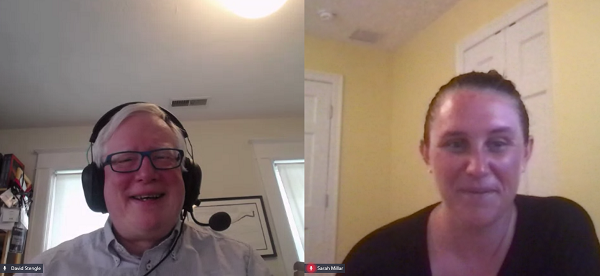Startup Grind Princeton Meeting Shines a Light on Developing More Diversity in Venture Capital Companies
New Jersey native Sarah Millar, principal at City Light Capital (New York), talked with David Stengle, founder and organizer of Startup Grind Princeton, about how to ensure that venture capital companies address diversity and inclusion issues.
City Light Capital is an early-stage impact investing fund focused on companies at the seed or Series A stage and that have a positive social and environmental impact on education, the environment, safety and healthcare, all very broadly defined, Millar told the group.
Outside of her job at City Light, Millar is the U.S. lead for an international organization called Diversity VC (London), “which, as the name implies, focuses on diversifying venture capital, with the premise that if you can diversify who is making investments, you will also diversify who is receiving capital on the founder side.”
Diversity VC, a nonprofit partnership, began in Britain as part of a government initiative to make sure government funds were being distributed fairly. Its first project was to look at the teams of VCs that were making the decisions about what the government had been investing in in. And the numbers came back, “almost exactly how you’d expect,” Millar noted.
Is The Flood Of Money Into Diverse Startups Real?
In the United States, Diversity VC is currently looking at the “flood” of money into diverse startups and founders, and trying to “measure whether or not that flood that we’re all seeing headlines about is actually happening; if there is actually capital that’s being diverted or that’s being created to invest in those funds; and then, subsequently, are those funds that are run by [self- identified] diversity VCs actually investing in diverse entrepreneurs at a higher rate than their counterparts.”
Millar noted that, through standards developed by the British wing of the organization, VCs can assess themselves based on criteria like: “Do you proactively look for deal flow coming from diverse founders? Do you provide DEI [diversity, equity and inclusion] support to your existing portfolio in terms of, for example, encouraging them to hire people to their boards that are from diverse backgrounds? And do you have a recruiting policy that allows you to partner with organizations that are trying to put talent from underrepresented backgrounds into VC positions?”
Diversity Playbook For VCs
The British organization has developed a playbook for VCs explaining what they should add to their HR systems and elsewhere in the operations of their companies to attract diverse employees. For example, they learn what a good parental leave policy looks like, she said. The U.S. organization also participates in “Future VC,” which is an internship program that “we facilitate every summer, placing talent from underrepresented groups into eight-week internships with funds around the country,” she said.
For startup founders, Millar noted that the company looks at who is on the leadership team, and if they have decision-making power. It also looks at things like the startup’s suppliers. For instance, are you proactively looking to acquire software or any other kind of third-party platform from companies founded or run by people from underrepresented backgrounds?
Some 60 venture capital funds have tested themselves against the standard, she said, including some pioneer funds like 500 Startups (San Francisco), Bessemer Venture Partners (New York) and Microsoft’s Venture Fund (San Francisco). Some 20 additional funds are on board to take the assessment soon, she added. And it’s not a trivial process. “We’ve actually gotten a lot of interest from corporate venture capital funds. Based on the way that we do the assessment, the standards tend to check all the boxes around recruiting and HR.” Diversity here is “mandated by the government, anyway, so the VCs can demonstrate best practices” this way.
For early-stage investors who only invest in black and brown founders or who primarily invest in female founders, going through this process is more of a marketing tactic, “signaling to the entrepreneurs that ‘we are open for your business, we have gone through this assessment process, we want to be part of this community.’” Diversity VC doesn’t give these investors the certification unless they pass, but for them, “it’s about being present and signaling that this is something they care about.”
Millar explained how the criteria are ranked so that VCs can qualify by ticking a number of different boxes. For example, one of the options in the assessment concerns portfolio support. They ask: Do you provide any kind of mental-health or diversity-and-inclusion training to the companies in your portfolio? “Not everyone has the budget to do that.” However, there are eight other options that the VCs can choose from that are ranked equivalently, she said.
In response to a question by Stengle about how an entrepreneur can assess the sincerity of an investor claiming to adhere to DEI standards, Millar noted that startup founders can ask the funds how they think about diversity, how DEI is manifest in their organizations. They can ask how the investors support their portfolio companies in terms of DEI. “You can tell when people are going around in circles” and don’t really prioritize this, she said.




